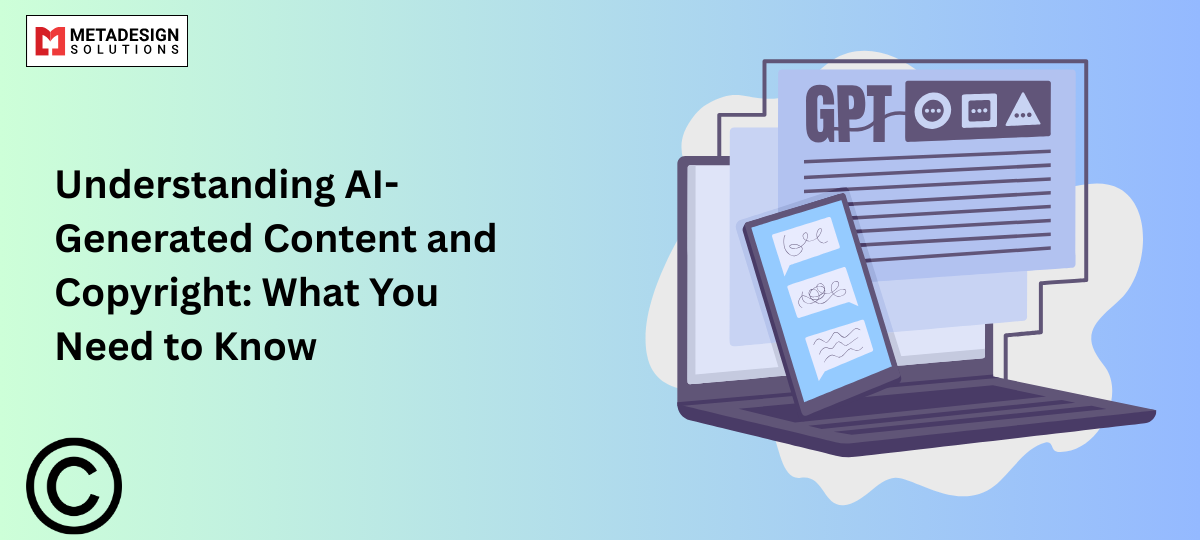Introduction
Artificial intelligence (AI) is revolutionizing content creation, from writing and music composition to visual arts and even software development. However, the rapid rise of AI-generated content raises crucial questions about copyright law: Who owns AI-generated content? Can AI itself be recognized as a copyright holder? And what level of human input is necessary to claim authorship?
To address these concerns, the U.S. Copyright Office has published a comprehensive report titled “Copyright and Artificial Intelligence, Part 2: Copyrightability” (January 2025). This blog post summarizes key insights from this report and explores the legal and ethical implications of AI-generated content.
What is AI-Generated Content?
AI-generated content refers to any creative output—text, images, music, videos, or software—produced by artificial intelligence models such as ChatGPT, DALL·E, MidJourney, and others. These models are trained on vast datasets and can generate new content based on prompts from users. However, since AI lacks independent human creativity, questions arise regarding whether its outputs should be eligible for copyright protection.
Clarify Copyright for AI Content
Confused about rights around AI-generated media? Connect with MDS for a legal-tech consultation on compliance and content protection.
Copyright Challenges with AI-Generated Works
Copyright law traditionally protects “original works of authorship” created by humans. The key issues surrounding AI-generated content include:
- Lack of Human Authorship: Courts have consistently ruled that only human authors can hold copyright protection.
- Role of Prompts and Inputs: Some argue that detailed prompts given to AI constitute creative input, while others believe AI-generated content lacks the necessary human originality.
- Variability of AI Outputs: AI models can produce different results for the same input, making authorship claims complex.
The U.S. Copyright Office has analyzed these issues extensively, concluding that works generated entirely by AI are not copyrightable, but works that incorporate AI with significant human involvement may qualify for copyright protection.
The U.S. Copyright Office’s Stance on AI and Copyright
The “Copyright and Artificial Intelligence, Part 2: Copyrightability” report outlines the U.S. Copyright Office’s position:
- Human authorship is required: The Copyright Office reaffirms that copyright law protects only works created by human beings.
- Use of AI as a tool is acceptable: If AI is used to assist human creativity (e.g., editing, refining), the human author can claim copyright.
- Purely AI-generated content is not eligible: If a work is generated entirely by AI without significant human input, it is not copyrightable.
- Case-by-case evaluation: Claims for copyright protection in AI-assisted works must be examined individually to assess human contribution.
Human Involvement and Copyrightability
The key factor in determining copyright eligibility is the extent of human involvement in AI-generated works. Courts and the Copyright Office consider:
- Prompts and Input Complexity: Simple or generic prompts (e.g., “generate a landscape painting”) do not establish authorship. However, detailed and iterative prompts that heavily shape the final output may be considered a creative contribution.
- Expressive Contributions: If a human modifies, arranges, or creatively selects elements from AI-generated content, those aspects may be protected.
- Artistic Direction vs. Execution: While an AI model may produce content, if a human creatively selects, edits, or integrates that content into a larger work, copyright protection may apply.
International Approaches to AI and Copyright
Other countries are also addressing AI and copyright in different ways:
- European Union: EU copyright law emphasizes human authorship but is exploring new legal frameworks for AI-generated content.
- United Kingdom: The UK provides a unique “computer-generated works” provision, granting copyright to the human behind the AI’s creation process.
- China & Japan: China has ruled that AI-generated content lacks copyright protection, whereas Japan allows limited protection under certain conditions.
These diverse approaches indicate the ongoing global debate on AI and copyright.
Legal and Policy Considerations
The debate over AI-generated content and copyright involves several policy questions:
- Should laws be amended to recognize AI-generated works? Some argue that AI-generated content should have limited copyright protection, while others fear this could reduce incentives for human creators.
- Should there be a new legal framework for AI-generated content? Some legal scholars suggest a new “AI copyright” or “sui generis” right to regulate AI-generated works separately.
- How will AI impact traditional creative industries? The potential flood of AI-generated content raises concerns about market disruption and unfair competition.
Conclusion
AI-generated content presents exciting opportunities but also complex legal challenges. The U.S. Copyright Office’s latest report reinforces the principle that human creativity remains central to copyright protection. While AI can be a powerful tool for artists, writers, and developers, legal recognition of AI-generated works will depend on ongoing legislative and judicial decisions.
For a deeper dive into this topic, we recommend downloading and reading the full “Copyright and Artificial Intelligence, Part 2: Copyrightability” report.
Further Reading & Download the Full Report
You can download the full U.S. Copyright Office report on AI and copyright here: Download the PDF Copyright-and-Artificial-Intelligence-Part-2-Copyrightability-Report_compressed
For any AI-related software development work or consultancy, contact MetaDesign Solutions at sales@metadesignsolutions.com.
About the Author
Amit Gupta is a technology consultant and copyright law researcher with over a decade of experience in software development and intellectual property law. He specializes in AI-driven content creation, digital rights management, and software licensing.
Related hashtags
#AIGeneratedContent #CopyrightAndAI #AIContentRights #AIEthics #AIRegulation #ContentOwnership #DigitalRights #ArtificialIntelligence #FutureOfContent #EthicalAI #AICompliance #AITrends2025 #ContentCreation #TechLaw #IPLaw #AIinMedia #aidevelopmentcompany #aidevelopmentservices #hireaidevelopers #aidevelopment #aiintegration #enterpriseAI #customAIdevelopment
